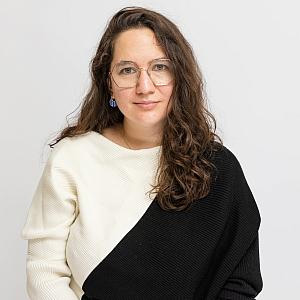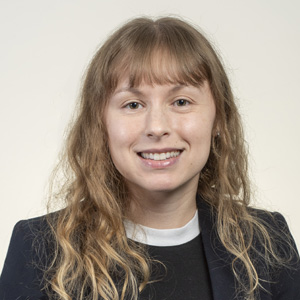Student Stories
Meet the class of 2026

Elsie Bunyan
From an early age, Elsie Bunyan has been captivated by the biological world. That curiosity led her to a career in pulmonary research at Northwestern University’s Feinberg School of Medicine, studying the mechanisms of pulmonary fibrosis. Through that work, Elsie realized she wanted to contribute to the prevention of disease on a population level.
Why choose the MS Epi?
For me, it came down to the focus on methods and statistics — skills I see as essential for the career paths I am most interested in, whether as a health data scientist, an analyst or ultimately pursuing a PhD in epidemiology. Plus, the MS in Epi requires a thesis to graduate, so I knew that I would gain hands-on experience with the full research process, from choosing a topic, to designing a study, to running analyses, and interpreting results — skills that will not only strengthen my ability as a researcher, but also prepare me to contribute to the kind of evidence-based prevention work I aspire to do.
Any observations on the program?
The program is selective, so there are only four of us in the cohort, which has been a good thing. I’ve gotten to know the other students really well, and because there are only four of us, it’s easy to talk with the mentor and get one-on-one feedback. This makes it a much more personalized type of program.
What are your plans post-graduation?
My long-term goal is to apply the skills I’ve gained through this program in methods and statistics to roles such as biostatistician, health data scientist, or infection control specialist, where I can contribute directly to research, data-driven decision-making, and disease prevention. After completing the MS in Epidemiology, I may pursue these opportunities immediately or continue on to a PhD to deepen my expertise. Either way, the program has equipped me with the tools to make a meaningful impact, and I am keeping an open mind as I explore the career paths that align with my interests.

Hannah Harris Green
As a health journalist, Hannah Green has built a career investigating the biggest health challenges facing our country. For her, the MS in Epidemiology is an opportunity to refine her scientific expertise and seek out answers that have previously evaded her and other reporters.What leads a health journalist to study epidemiology?
I have been reporting on the issue of overdoses for a while, and I have gotten to the point where the tools of journalism are no longer enough to unpack the situation. To really understand what’s happening, I need to learn the scientific processes of epidemiology so I can do my own analysis and look for answers on my own. Having that ability to combine epidemiology and data analysis with my journalism will help my work make more of an impact on public health.
What was the catalyst for that realization?
A lot of the recent reporting on the overdose crisis shows that overdose-related deaths have been on the decline, but no one has a definite answer as to why. Some people say it’s because Naloxone is more widely available, but there’s still a lot of uncertainty about whether that’s the real cause. I find that very frustrating, and the MS in Epi gives me the opportunity to work with other researchers to get to the bottom of it.
So why pick the MS in Epi over other degrees?
Getting a Master of Science and focusing more on the hardcore stem elements of epidemiology made the most sense. I've been reporting on public health for so long that I have a lot of that knowledge already. I need to focus on hard skills such as coding and statistics, so this program was the obvious choice.
Thoughts on the program?
One thing that’s surprised me is the level of student engagement. I am older than most of the students. A lot of them are recent graduates, whereas I have an established career as a journalist, and it's really given me a lot of hope. So many of them are doing really interesting work in public health already. They’ve shown me that there’s a lot of potential and drive in their generation.

Lauren Karavites
With a background in biology and a lifelong interest in medicine, Lauren Karavites explored several career paths before discovering a passion for epidemiology research. She comes to the MS in Epi seeking a new avenue for delving into the nuances of population health.
Why choose the MS Epi?
My goal is to transition into a new career that’s research-centric, so it was important that my degree provided a strong, in-depth education on the whole research process. Plus, doing the master’s degree opens up the door to a PhD if I decide to go in that direction. Regardless, I know that having a master's thesis in my portfolio will open a lot of doors.
How’s the program so far?
I am really enjoying the Introduction to Epidemiology and Infectious Disease Epidemiology courses. Those both hit on many of my core interests, and they’ve given me a chance to design a study — which was a lot of fun.
What are your plans for the future?
I want to use everything I learn here to make an informed decision about where I go next. But I am very interested in the epidemiology of mental health. The burden of mental health conditions is on the rise and it’s an area that needs more research. If I do not go on to do my PhD right away, I would like to work on a meta-analysis review.
Alumni Stories

Cassandra's Story
Driven by her desire to make an impact beyond the lab, Cassandra Sala, ‘25 MS, is working to understand the demographic characteristics of rare skin diseases through the Master of Science in Epidemiology program.
